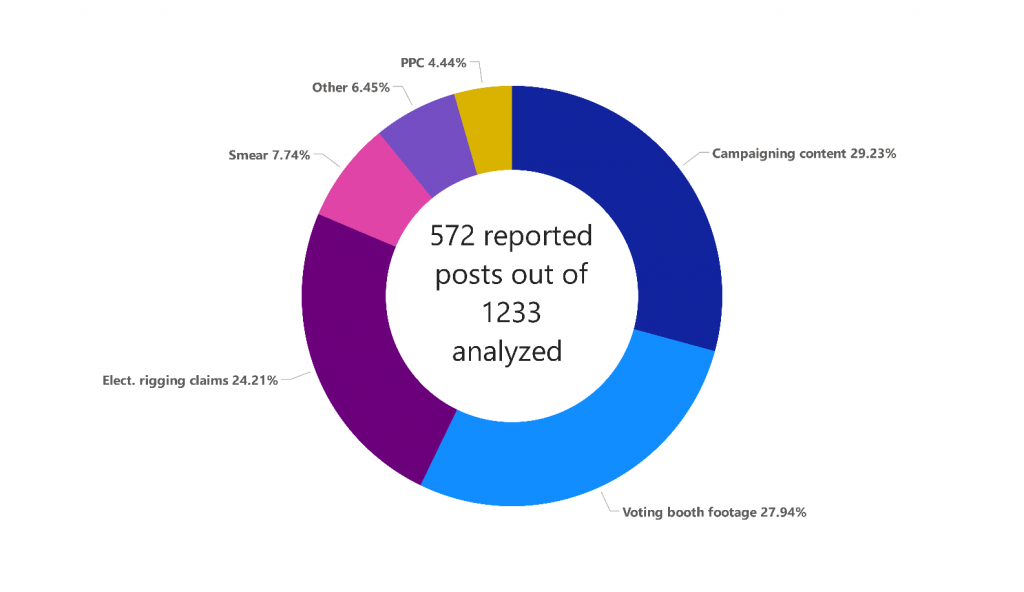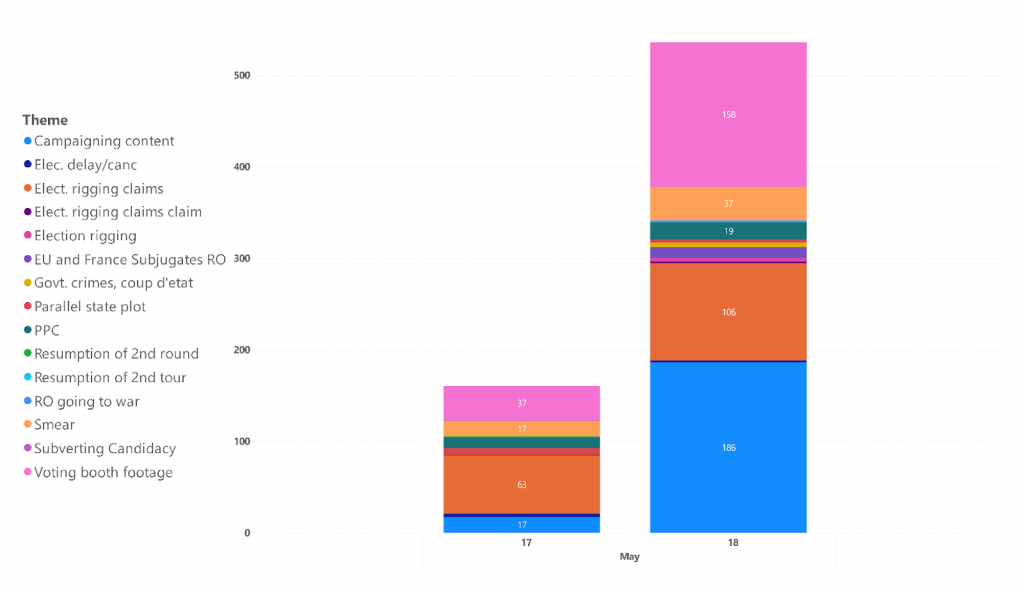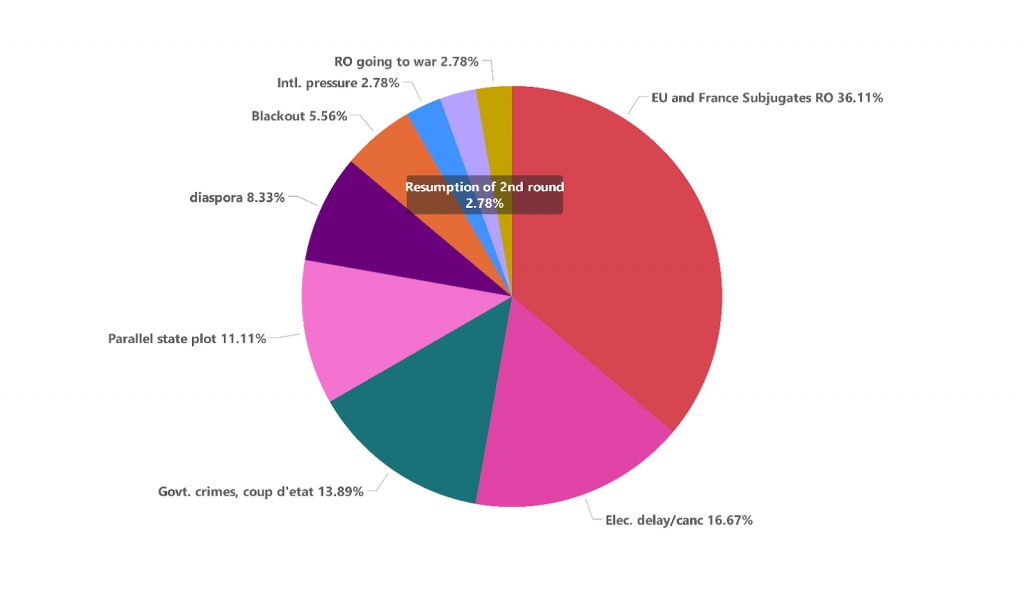Romania on election day – 4 Hours Before Polls Close – 18 MAY 2025
This Bulletin is produced and published by Funky Citizens, Member of the Bulgarian-Romanian Observatory of Digital Media (BROD) and the EDMO Fact-Checking Network.
EXECUTIVE SUMMARY
With just four hours until polls close, Romania’s presidential runoff has recorded impressive participation—8.45 million votes by 4 PM (25% increase domestically, 74% surge in diaspora). Election day controversies include Moldova Police rejecting AUR’s voter transport allegations as “manipulation,” Realitatea Plus being fined for illegal campaign broadcasts, and the Electoral Authority refuting claims about inaccurate voter lists. The information landscape has become a battlefield dominated by disinformation: illegal voting booth footage, premature victory claims, and electoral fraud accusations targeting Moldovan voters—often with antisemitic undertones.
WEEKLY OVERVIEW
Though the growth rate has slightly decreased, Romanian voter participation remains strong. By 4 PM, 7.16 million votes had been cast within Romania—1.45 million more than at the same time in the first round. The diaspora has contributed 1.3 million votes, bringing the total to 8.45 million votes in both domestic and international polling stations. This represents an increase of over 25% in Romania and over 74% in the diaspora compared to the first round.
The General Inspectorate of Police in the Republic of Moldova has firmly denied accusations made by the Alliance for Romanian Unity (AUR) regarding the alleged organized transport of voters to polling stations. “It’s manipulation,” declared Viorel Cernăuțeanu, head of the National Police in Chișinău, in a statement to HotNews. AUR and its candidate George Simion had claimed that “multiple cases of organized transport in Chișinău, including columns of buses and minibuses full of students and pensioners, accompanied by local PAS representatives, being taken in an organized manner to polling stations” were occurring. The police clarified that what AUR identified as voter transport was actually related to an “Open Doors Day” event at the Technical University of Moldova, where approximately 120 students from different localities arrived in six coaches.
This represents the latest in a series of accusations from Simion regarding alleged election fraud in Moldova, which have been consistently rejected by Moldovan authorities. The controversy unfolds against the backdrop of record turnout from Moldovan voters participating in Romania’s presidential elections. Over 100,000 citizens cast ballots at 64 polling stations—including 75,000 votes during the first two days alone, more than double the turnout compared to the first round two weeks ago.
Nicușor Dan voted in Făgăraș, his hometown, where he was greeted with applause from local supporters. Accompanied by his partner Mirabela Grădinaru, Dan made a pointed statement before voting: “There aren’t two Romanias, one of big cities and one of small towns. There is only one Romania.” Dan explained his choice to vote in Făgăraș as a symbolic gesture to emphasize that “there shouldn’t be two Romanias, one of big cities and one of rural areas and small towns,” adding that “we must distribute prosperity throughout Romania.”
George Simion voted in Mogoșoaia, Ilfov, alongside Călin Georgescu. Both arrived with their wives and attempted to make statements inside the polling station before police asked them to move outside. Georgescu spoke first, stating: “I voted for the Romanian family, where the words mother and father remain sacred. I voted for our country, here and everywhere, which needs love, forgiveness, and healing more than ever.” Simion followed: “I voted against the injustices done to the Romanian people, against the inequities and humiliations to which our sisters and brothers have been subjected both here and everywhere, against abuses and poverty, against those who disregard us all, but at the same time I voted for our future to be decided only by Romanians, for Romanians and for Romania. So help us God.”
On Saturday, Simion’s TikTok account with 1.5 million followers became inaccessible, prompting speculation about potential platform action. However, TikTok representatives confirmed that the account was closed by Simion himself. Simion later announced that he was closing his Facebook account as well “to respect the day of silence,” while remaining active on X where he posted a video message in English while getting a haircut. His first Facebook post after reactivating his page—followed by over 1.6 million people—was a LIVE transmission at 8:00 AM from his voting location.
By Sunday afternoon, AUR accused Nicușor Dan’s team and supporters of “illegally continuing electoral promotion activities online” despite the campaign officially ending at 7:00 AM. The party called on the Central Electoral Bureau to “intervene promptly to protect the integrity of the electoral process” and “decide to eliminate this content and not overlook the continuation of the electoral campaign by Nicușor Dan, as they did in the first round.” AUR also accused foreign companies of encouraging votes for Dan: “We also call on representatives of foreign companies, such as Decathlon, to stop the electoral campaign and no longer urge employees and customers to vote for Nicușor Dan, but to let Romanians choose freely, as is democratic!”
The Permanent Electoral Authority (AEP) has officially rejected claims circulating in public regarding inaccuracies in the permanent electoral lists, stating these allegations are false. The AEP clarified that they have received no official communication from any political formation regarding specific instances of deceased persons appearing on the lists for Sunday’s election. The AEP’s statement comes in response to allegations made by AUR candidate George Simion, who claimed inconsistencies in the electoral lists.
Television network Realitatea Plus was fined 10,000 lei (approximately 2,000 euros) by the National Audiovisual Council (CNA) for broadcasting what amounted to campaign material for George Simion on election day—a violation of electoral laws. Despite campaign activities being prohibited on election day, the channel aired footage of George Simion and his wife Ilinca for several hours.
SOCIAL MEDIA DISINFORMATION
The narratives circulating around the Romanian elections are anchored in a few dominant themes which exploit political polarization, conspiracy theories, and identity-based attacks. Central among these is the dissemination of illegal voting booth footage, encouraging the exposure of voter choices. This is coupled with unauthorized campaigning, often involving misleading or prematurely celebratory claims of victory. Electoral rigging accusations form another major pillar, with repeated allegations targeting the Moldovan diaspora and Maia Sandu, frequently laced with antisemitic and anti-EU sentiments. Similarly, smear campaigns against Nicușor Dan use manipulated media and conspiracy-driven narratives to attack his character, portraying him as part of an elite, foreign-controlled agenda. The PPC (Premature Polling Claims) further exacerbate distrust by promoting fabricated polling figures to falsely legitimize either candidate’s supposed lead.

In addition to these core narratives, several secondary themes reinforce a broader narrative of democratic collapse and foreign subjugation. Claims of election delays or cancellations, foreign domination by the EU and France, and coup d’état scenarios feed into fears of a “stolen” Romania. The concept of a Parallel State Plot merges domestic and international elements, suggesting a hidden alliance of Romanian institutions, global elites, and the media manipulating national outcomes. Diaspora voting fraud, blackouts at polling stations, and demands for the resumption of the second election round aim to delegitimize the technical integrity of the election process. Alarmist themes such as Romania going to war amplify fear, particularly when tied to Nicușor Dan’s potential victory. Candidate-specific attacks also follow these patterns: Simion is presented as a populist savior fighting an oppressive system, while Dan is vilified as a puppet of globalist, Jewish, and European interests. These themes not only reflect deep ideological divisions but also weaponize disinformation to manipulate public opinion and sow mistrust in democratic institutions.
The main themes
“Voting Booth Footage” refers to posts that include footage or images taken inside voting booths, explicitly revealing voters’ choices. Such content is repeatedly flagged as illegal because it violates electoral laws that protect voter privacy and the confidentiality of the ballot. The repetition of similar warnings emphasizes that these posts not only breach privacy norms but also potentially undermine the integrity of the election by broadcasting individuals’ selections and actively instructing citizens to do so.
“Campaigning Content” captures materials that involve unauthorized and illegal political campaigning within the election day. Posts include repeated claims that Simion was being unfairly censored, such as the removal of his social media accounts, or false assertions that he had already won the presidency. AI-generated images were used, together with allegations of a rigged system.
Electoral Rigging Claims (Elect. rigging claims) includes extensive allegations of electoral fraud, particularly implicating Moldovan President Maia Sandu and the Moldovan diaspora. Posts claim that Sandu’s supporters are engaging in mass fraud by busing people to vote illegally and that Moldovan citizens may have their passports revoked as part of the manipulation. The narrative frequently associates Sandu with George Soros and uses antisemitic undertones, as well as anti-EU sentiment.
“Smear” encompasses a wide range of defamatory and manipulative content aimed primarily at discrediting the candidate Nicușor Dan. Posts use conspiracy theories and misinformation to associate him with controversial figures such as George Soros, Ursula von der Leyen, and Emmanuel Macron, portraying him as a puppet of foreign powers or elite interests. There are repeated antisemitic insinuations, such as claims that he is Jewish and will divide Romanian land to benefit Israel and Hungary. Other posts use AI-generated or digitally altered content to fabricate compromising scenarios, such as portraying Dan as intoxicated or associating him with war and geopolitical instability. Smears also target his character and personal life, falsely alleging his sexual orientation, health issues, and intentions to rig elections or incite violence.
PPC (Premature Polling Claims) refers to posts that present alleged polling results or vote counts before official data is available, often in exaggerated or fabricated terms. These claims show dramatic leads for either George Simion or Nicușor Dan, with percentages ranging from 48% to over 99%.

The minor themes
Other posts referenced “Election delay or Cancellation (Elec. delay/canc)” involving claims that the Romanian elections will be delayed or annulled. Posts suggest conspiracies such as the Constitutional Court considering canceling the vote if George Simion leads, or rumors that Maia Sandu or French forces might cancel the elections altogether.
EU and France Subjugates RO refers to content alleging that Romania is being dominated or manipulated by France and the European Union. Posts claim French military involvement in the elections, suggest Macron and Maia Sandu are rigging outcomes, and repeatedly assert that the EU has stolen Romania’s sovereignty. These narratives portray the Romanian public as enslaved or exploited, often in emotional or hyperbolic language.
“Govt. Crimes, Coup d’état” are referencing the alleged implication of the Romanian state in crimes against its own citizens. It also suggests that the annulment of last year’s elections was part of a coup d’etat perpetrated by occult forces in the Romanian government.
“Parallel State Plot” refers to narratives suggesting that an unseen or illegitimate “system” has taken control of the electoral process, often referred to as a “parallel state.” Posts claim that the elections were annulled by this hidden power and that future votes will be manipulated or rigged. This code does not only refer to Romanian state institutions as being part of this parallel system, but a wider network including media and international organizations.

The “Diaspora” code appeared in conjunction with election rigging claims and alleges systematic election fraud targeting the Romanian diaspora. Claims include ballot boxes being left unsecured overnight, the swapping of ballots, and polling places operating without internet connectivity—supposedly to facilitate undetected fraud. Thes posts do not include the ones specifically referring to the Republic of Moldova or Maia Sandu.
“Blackout” involves claims that lack of internet access at polling stations is being used as a deliberate strategy to enable fraud. Posts allege that cutting internet connectivity prevents oversight and facilitates activities such as multiple voting.
“Resumption of 2nd Round” claim that the Electoral Court has ordered a repeat of the second round of elections. This narrative serves to delegitimize the original outcome, suggesting that electoral authorities themselves recognize irregularities or manipulation. A similar code is “Intl. pressure”, where the narrative suggests that the US is imposing sanctions on Romanian officials due to voting fraud or other crimes.
“RO Going to War” features alarmist claims that Romania is on the brink of war, specifically alleging that Russia will take control within 72 hours. Posts further assert that Romanian institutions are already incapacitated.
This newsletter is part of our ongoing work with the Bulgarian-Romanian Observatory of Digital Media, member of EDMO.
Author: Funky Citizens
